
Puerto Rico is a Euro-style board game designed by German designer Andreas Seyfarth and published in 2002 by Alea in German, by Rio Grande Games in English, by Grow in Brazilian Portuguese, and by Κάισσα in Greek. Players assume the roles of colonial governors on the island of Puerto Rico during the age of Caribbean ascendancy. It was the highest-rated game on the board game website BoardGameGeek for over five years, until it was surpassed by Agricola. The aim of the game is to amass victory points in two ways: by exporting goods and by constructing buildings.

Citadels is a German-style card game, designed by Bruno Faidutti, originally published in French as Citadelles by MultiSim in 2000, illustrated by Julien Delval, Florence Magnin, Jean-Louis Mourier and Cyrille Daujean as graphic designer for the first edition. Sometime later, Citadels was published in German as Ohne Furcht und Adel, which means "Without Fear or Nobility".

Empires in Arms is an out-of-print board game by Harry Rowland, published by the Australian Design Group in 1983. It was licensed to the Avalon Hill Game Company in 1985. It was nominated for the Charles S. Roberts Award Best Professional Game of the Year at Origins '84.
Capitol is a German-style building game set in the ancient Roman Empire, designed by Aaron Weissblum and Alan R. Moon. The game was published by Schmidt Spiele in 2001. It was redeveloped into a quicker-playing card game named Clocktowers and published by Jolly Roger Games.
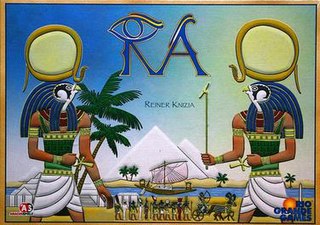
Ra is a board game for two to five players designed by Reiner Knizia and themed around Ra, the sun-god of Heliopolis in ancient Egyptian culture. It is one of three auction games designed by Knizia, the others being Medici and Modern Art.

Caylus is a strategy oriented, German-style board game designed by William Attia and independently published in 2005 by Ystari in France and England, and Rio Grande Games in North America. Caylus has a mix of building, producing, planning, and bargaining — without direct conflict or dice-rolling mechanics.
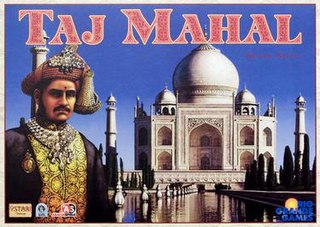
Taj Mahal is a German-style board game for 3–5 players designed by Reiner Knizia and first published in 2000 by Alea in German.
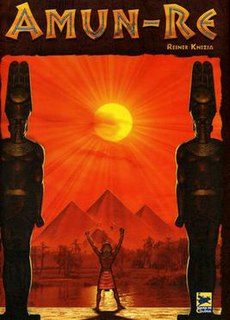
Amun-Re is a game designed by Reiner Knizia and first published in 2003 by Hans im Glück in German and in English by Rio Grande Games.

Experiment is a dedicated deck card game for 3-6 players designed by Tim De Rycke and Sander Vernyns. The illustrations were created by board game designer Kenneth Van Bogget

Britannia is a strategy board game, first released and published in 1986 by Gibsons Games in the United Kingdom, and The Avalon Hill Game Company in 1987 in the United States, and most recently updated in late 2008 as a re-release of the 2005 edition, produced by Fantasy Flight Games. It broadly depicts the wars in, and migrations to, the island of Great Britain in the centuries from the Roman invasions to the Norman Conquest.
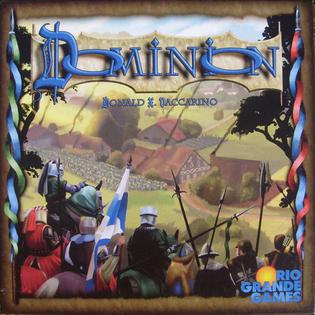
Dominion is a deck-building game created by Donald X. Vaccarino and published by Rio Grande Games. It was the first game of its kind, and inspired a genre of games building on its central mechanic. Each player begins with a small deck of cards, which they improve by purchasing cards from a common supply that varies from game to game. Cards can help the player's deck function, impede their opponents, or provide victory points.

Race for the Galaxy is a card game designed by Thomas Lehmann. It was released in 2007 by Rio Grande Games. Its theme is to build galactic civilizations via game cards that represent worlds or technical and social developments. It accommodates 2-4 players by default although expansions allow for up to 6 players, as well as solo play. The game uses iconography in place of language in some places, with complex powers also having a text description. While appreciated by experienced players for being concise, some new players find the icons difficult to learn and decipher.
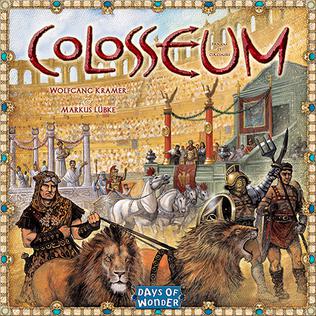
Colosseum is a board game by Markus Lübke and Wolfgang Kramer, published in 2007 by Days of Wonder and illustrated by Julien Delval and Cyrille Daujean. In the game, players attempt to attract the most spectators to the events in their arena.

Mariáš or Mariasch a three-player, solo trick-taking game of the King–Queen family of Ace-Ten games, but with a simplified scoring system. It is one of the most popular card games in the Czech Republic and Slovakia, but is also played in Bavaria in Germany as well as in Austria. The Hungarian national card game Ulti is an elaboration of Mariáš.
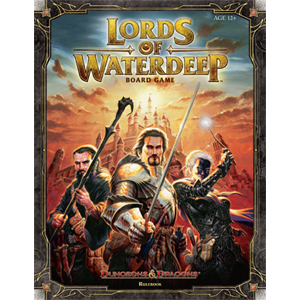
Lords of Waterdeep is a German-style board game designed by Peter Lee and Rodney Thompson and published by Wizards of the Coast in 2012. The game is set in Waterdeep, a fictional city in the Forgotten Realms campaign setting for the Dungeons & Dragons role-playing game. Players take the role of masked rulers of Waterdeep, deploying agents and hiring adventurers to complete quests and increase their influence over the city.

Terra Mystica is a Euro-style board game for two to five players designed by Helge Ostertag and Jens Drögemüller. The game was first published by Feuerland Spiele in Germany in 2012, and was later published in English and French by Zman Games and Filosofia Édition in 2013. Feuerland Spiele released a second German edition of the game in 2013.

Splendor is a multiplayer card-based board game, designed by Marc André and illustrated by Pascal Quidault. It was published in 2014 by Space Cowboys, Asmodee. Players are gem merchants of the Renaissance, developing gem mines, transportation, and shops to accumulate prestige point. Spelendor received positive reviews and received numerous awards, including winner of Golden Geek Best Family Board Game, and nominated for the Spiel des Jahres Game of the Year in 2014. The game also received a mobile application and an expansion released in 2017.
Evolution: The Origin of Species is a card game created by Dmitriy Knorre and Sergey Machin in 2010. The game is inspired by the evolutionary biology. It was published by SIA Rightgames RBG. English, French and German game editions were published in 2011. Two or more players create their own animals, make them evolve and hunt in order to survive.
The Genius: Rule Breaker is the second season of The Genius, which debuted on tvN on December 7, 2013.

Isle of Skye: From Chieftain to King is a tile-laying board game designed by Alexander Pfister and Andreas Pelikan that was published in 2015. It uses the Isle of Skye as its setting, with players representing clan chieftans each vying to build a kingdom.

















